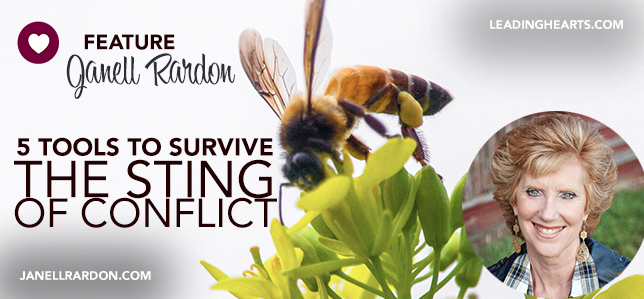When confronted by the mean words/actions of others, yield immediately by praying three words: God help me.

STANDING IN AN OLD CORNFIELD WITH NOTHING BUT A SLEEVELESS BLOUSE AND JEANS TO PROTECT ME, THOUSANDS OF BEES BUZZED AROUND ME. “Should I be nervous?” I asked Greg, my novice beekeeping-pastor, who graciously invited me into his world of beekeeping.
Knowing I was working on a manuscript centered around the concept of spiritual unity, he wanted to show me a few things he had learned by observing his bees.“Oh, no,” he said. “Just stay out of their flight pattern. Move a little to the left and you’ll be fine.” “They have a flight pattern?” I gazed about. “Yeah, sure. See? You can see them coming in for a landing. Straight to the hive.” “Got it,” I said. “Let me get out of their way.”
He smiled. “As long as a bee doesn’t feel threatened, everything is OK.”
Greg’s words were the aha moment I’d been waiting for. “Wow, Greg,” I said. “You were right. Your little bees do have a lesson for me and my readers.”
It seems we are all OK until a threat enters our “perceived flight path,” i.e., our domain of home, work, family, relationships, ministry or leadership.
When We Are Threatened In the “real world of humans,” getting in the flight pattern of someone is often referred to as “relationship discord,” or if really intense, “relational aggression,” i.e., bullying others through mean words (verbal), actions or attitudes (non-verbal).
We are human, which means we will be imperfect, and as Dr. Sandra Wilson writes in Hurt People Hurt People, “Hurt people hurt others because they themselves have been hurt. And each one of us has been hurt to one degree or another. As that damage causes us to become defensive and self-protective, we may lash out at others. Hurting becomes a vicious cycle.”
These unhealthy behaviors happen in all types of “hives” — the home, workplace, school, community activities and even in the church. Sometimes it is blatant and in your face. Sometimes it is hidden under the facade of well-meaning suggestions, advice or counsel. Sometimes it is wrapped in sarcasm or ill-fitting humor. Other times it the result of differing opinions, world views or personality types.
This hurt can be intentional or unintentional. No matter how they are delivered, these behaviors leave a very painful sting of disunity.
Maybe you are in the flight pattern of someone, right now. The sting of disunity is causing a big red welt of emotional angst in your heart. You need an antidote and have no idea where to look.
I’ve been there, and if I am honest, I’ve delivered the sting of disunity, too. As a result, I realized the first place I needed to look was my own heart. Thousands of books and resources have been created around solving this problem, but I found one great piece of advice that helped me the most.
Tucked in Leviticus 19:17-18.
“Do not hate a fellow Israelite in your heart. Rebuke your neighbor frankly so you will not share in their guilt. Do not seek revenge or bear a grudge against anyone among your people, but love your neighbor as yourself. I am the Lord.”
TOP 5 TOOLS OF UNITY
Knowing I would need a lot of practice in this area, I created an Emergency Response Plan, which I lovingly call “The Unity Tool,” based on the words of Leviticus.
1. Use your voice.
In my work, I equate “voice” with “value.” When you know your God-breathed identity (Genesis 2:7), i.e., your value, worth, and dignity, you behave accordingly. Take the necessary time to develop your own healthy behaviors and communication skills. Learn how to respond, not react. You are the only person you can change, so start there.
2. Nourish your soul.
During my own emotional health crisis, I found another passage in Ecclesiastes 4:6, “Better one handful with tranquility than two handfuls with toil and chasing after the wind.” When we move through life from a posture of exhaustion, fatigue and emotional depletion, we are more likely to have less emotional reserve. Take good care of your heart, mind and body.
3. Increase your relationship skills.
A real game-changer in my own capacity to get along well with others is understanding that each individual has different personality traits, opinions and ideas than myself. This allows me to be more understanding as I interact with others on a daily basis. There are many systems available. Just find the right one for you.
4. Take the direct road.
Writer Garrett Gunderson advises, “Be concise when confronting someone. If not, you lose power. Being concise means, you stick to one issue. You use facts, not feelings. Be specific about the issue at hand.” This will take practice, but eventually, it becomes second nature.
5. Yield the confrontation to God.
When confronted by the mean words/actions of others, yield immediately by praying three words: God help me. It is my automatic go-to mental mechanism. Viktor Frankl suggests that “between the stimulus and the response, there is a space,” and I call that, “a sacred space,” in which we choose to react or respond. That choice makes all the difference.
Always remember, though, that sometimes, no matter hard we try to keep the peaceful spirit of unity, personalities clash, perceptions differ and painful encounters happen. If this is the case, remember the wisdom of Paul in Romans 12:18,
“If it is possible, as far as it depends on you, live at peace.




Thank you, Janelle,
Words of wisdom; a good apologetic tool when defending your faith. We must remember to build a bridge of kindness as not to be a treat, then dialogue can pursue allowing us to be effective communicators for the Lord.
Very insightful and valuable advice.